#or decolonisation in general
Explore tagged Tumblr posts
Text
We haven't learned. We haven't learned shit at all.
My country's wealth is directly linked to the exploitation and colonization of other peoples. We call the violent acts commited in Indonesia after ww2 "police actions" as if it wasn't horrific crimes against people who were (justifiably) tired of being occupied and abused by foreign invaders and colonizing dickhats.
Sure, we "lost" the Dutch East Indies. We are not actively colonizing anymore. And yet, we still haven't learned a thing. That "VOC mentality" was never gone, it's still there. It's that mentality of thinking business above everything else, money makes right, who cares how horrifically you abuse people, who cares about the massacre of the Banda islands when you now have all the yummy nutmeg to use and sell. It's not something to be admired, it's something we have to address and resolve, but we're not. We're not doing that, but we have to if we ever want justice of any kind.
We're ruled by dickheads who think that saying "from the river to the sea" is a hatecrime that should be condemned. "Yeah sure, you would've probably said the same thing about the utterance of "Republik Indonesia" less than 100 years ago, no?" is what I say to that. We have not successfully freed ourselves of this damn colonizer mindset!
The only reason the Netherlands ever stopped the "police actions" is because we were threatened with sanctions. Post WW2, it was stop the "police actions" (read: many war crimes) or lose the money from the Marshall Plan needed to rebuild your ruined country. The choice was easy enough.
But noooooo, we can't sanction Israel to get them to, ya know, STOP BOMBING HOSPITALS, SCHOOLS AND CIVILIANS IN GENERAL!!! They're our friends! Fuck no. I know why those asshats ain't sanctioning Israel (at least one of the reasons): they'd lose access to fucking Pegasus; spyware surpreme. Wanna spy on some journalists? Perhaps the opposition? Scary activists? Pegasus is THE spyware for you! Infect ppl's phones and suck up All Teh Data wihout them knowing. Suspected detection of the stuff somehow? Self-destruct, boom. Fantastic stuff if you're into violating ppl's privacy. I don't see this talked about a lot, but Israel is Scary in the cyberwarfare department. And they sell this expertise.
I support Palestine. I hope to see it freed someday. Hopefully soon
To Israel(is): decolonize ur shit. I know, it's hard, it's painful, you'll have to question and unlearn a lot of things. Heck, it may give you an existential and/or moral crisis for a bit. I still get one about nutmeg sometimes. But just like desinfecting a wound, it is ultimately beneficial.
PALESTINIAN PEOPLE DESERVE LIFE AS MUCH AS ANY OTHER PEOPLE
#non sims#fire flower speaks#palestine#gaza#free palestine#israel#free gaza#what do you even say when you see such horrific things unfolding almost by the minute#I have been thinking a lot about this ever since our public broadcast shared a video of a literal colonist#she was french and colonizing on the west bank. she was ready to 'shoot the arabs' bc 'they shouldn't be harboring terrorists'#it kinda opened my eyes more to how horrific colonization is#colonization is evil#I cannot do anything about what my country did but I can object to such practices being practiced elsewhere#this is bigger than just palestine#even colonizers have to decolonize themselves#if anyone has any good recommendations on things to watch or read on Dutch colonization of Indonesia please share#or decolonisation in general#I am still learning. Please pardon my ignorance#(and pls send resources so I may work on resolving that)
12 notes
·
View notes
Text
seems incredibly unjust that i, chinese woman, have imprinted on a straight white man who drives a car in misshapen circles
#that 1/16 is really holding out#very crucial#decolonising my shipping#this is about op81 but really could be about any generic motorsport blorbo
15 notes
·
View notes
Text
saw someone tell people to read decolonisation academia in a post with a bad take that i don't wish to engage with, but it's funny telling people to learn about decolonisation from universities. Academia ime so far has been 'vague gestures that this land belongs to so and so people' or adding a text or two in the course from some not white author. would not recommend learning decolonisation from academia.
#decolonisation may be violent#may require a systemic change#not something that the generally very white liberal academia is willing to grapple with yet ime#in fact it really feels like they have diluted the meaning of decolonisation#because you see it everywhere in contexts where it is not necessary or needed#also u cannot even have a thesis on Palestine in white western academia advisers tell you not to incase it is marked down#i'm sorry but academia does have an agenda they cannot go against they cannot publish truly radical texts#people lose jobs in academia and elsewhere for supporting Palestine as a cause#decolonisation from academia is a joke#at the end of the day academia supports the status quo#people will do well to remember that
10 notes
·
View notes
Text
somehow the mixture of invasion day and calum posts (yes they finally arrived) on my dash is really fitting actually
#for those who don’t know it’s a weird holiday australia has#celebrating colonisation though most people don’t think too hard and just like having a day off work#like to go to the beach in the summer. most aussies don’t think too hard about it and that’s the tragedy#decolonising and indigenising australia is very important btw and we can do it in a kind way#and here his birthday was yesterday and I imagine growing up he probably didn’t think too hard about it but still it’s awkward#like legit invasion day growing up was just a day off in the first week of school every child needed#and sydney in general is pretty alright at celebration cultural and ethnic diversity#but now we get to celebrate an indigenous man (to nz not australia tho) who’s had all this success and stayed humble and kind#and when he’s shared the way he thinks it is in such a refreshing non colonial way as a mixed race aussie I do really feel#calum hood#go listen to his mirror sessions if u get a chance
1 note
·
View note
Note
Hey just wanna ask, but you know of hibernophobia? Cos I came across an Irish jew blog (sanguine-pigeon) when they discuss the general anti-Irish sentiment in Jumblr
Honestly I understand and agree with their perspectives.
Hey! Not sure I completely understand, from my perspective , the general sentiment is that the Irish are very anti-Semitic. That is because of their recent anti-Jewish/ Israel behavior (prime ministers’ comments & actions etc).
I’ve actually visited Ireland before the war and it was fine, but even then you could see some strong anti-Israel sentiment and we didn’t feel 100% safe in big cities.
I wish they could see our similarities-we were also colonised by the British , we relearned Hebrew as a way of decolonisation … unfortunately, It feels like they’re projecting their anti-British colonialism history on this conflict, and view us as the colonists / enemy.
I obviously don’t have a problem with Irish people as a whole, I just feel like some of the rules and comments their officials made are problematic .
I Hope my message got across clearly… have a great day 🫶
#Ireland#israel#jewish#israeli#jewblr#israel palestine conflict#gaza strip#ישראל#טאמבלר ישראלי#middle east#hamas is isis#jumblr#gaz#Palestine
53 notes
·
View notes
Text
“solely for the sake of making what’s going on easier to process” <- that’s exactly what people are doing, and it’s emotionally individualistic and morally shameful. If your response to this is to immediately search for a position that seems uncomplicated and totally comfortable to support, then you’ve made it about you, and not about what’s actually happening
Just a reminder that of the approximately 7 million Jews in the State of Israel, only about 300,000 of them (about 5%) are of American origin. Somewhere between 40-60% of them are Mizrahim from the SWANA region who were ethnically cleansed from places like Egypt, Iraq, and Morocco, or are Jews whose presence in the Holy Land predates Zionism entirely, and even among Ashkenazim, the largest source of immigration was Soviet Jews fleeing antisemitism in the USSR.
The idea that all or even most Israelis are wealthy Brooklynites or American citizens with dual passports is flatly untrue and antisemitic, and obscures the way that settler-colonialism utilizes the desperate and the dispossessed even among the people it claims to protect. It doesn't help anyone to fall back on antisemitic canards solely for the sake of making what's going on easier to process.
#the low bar for talking about this is not being Islamophobic or antisemitic#and people are failing massively#and if we’re playing collective responsibility games#then how’s the West going to atone for the generations of antisemitism and imperialism it wreaked on everyone now involved#university told me my culture was antisemitic but I never truly understood until now#a bunch of clowns in colonial superpowers unironically celebrating this as decolonisation#like genuinely celebrating this even though they haven’t gotten on a plane and decolonised their own goddam country#maybe just maybe this is famously one of the most complicated and agonised conflicts in the entire modern world#and maybe one day some of these people will know enough to look back on what they’re unironically saying right now with horror#because there are concrete things we can do to help Palestine#and none of these fucking people are interested in that#maybe this is all fucking awful and wretched#maybe we have to sit with that#israel#palestine#I wish Edward Said were here
922 notes
·
View notes
Note
I have a question what do you like of final of the Legend of Korra and What do you not like it ? ( S4)
Ah, B4. My favourite season and the season I hate the most at the same time. I have such mixed feelings about it and I think most of it stems from the utilisation of Nazi and Soviet imagery and inspirations in the Earth Empire.
Because it disrupts any sympathy, I could have towards the good Kuvira had done for the Earth Kingdom because of the IRL historical context behind those same pros in the regimes Kuvira was based on.
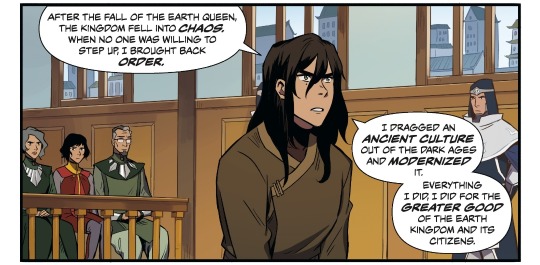
Technological advancements and modernisation? Made possible by essentially slave labour of the people of the country, particularly the prisoners of gulags, who were in huge part political prisoners (known as biełoruczki, if I remember correctly). I use the term 'political' very loosely because because many of the 'crimes' were just... really stupid. For example having rented a French book from a library.
Kuvira's attack on Republic City is also heavily recontextualised due to this context. Because, in a void, a woman of a county that has been heavily affected by a war trying to regain a former colonised region of her country that hadn't been returned after the end of the war is not a terribly immoral thing. You could even describe it as justified.
But with the context of Kuvira's inspirations it takes on a darker meaning as one of the Soviet and Nazi excuses for invading Poland in 1939. In the words of Timothy Snyder, historian and author:
Hitler saw Poland as the ‘unreal creation’ of the Treaty of Versailles, Molotov as its ‘ugly offspring.
Furthermore, even post-Soviet Russia has a similar pattern of dismissing the legitimacy countries that fall victim to their campaigns. For example, Putin justifying the current genocide and war crimes in Ukraine by claiming Ukraine to be historically Russian lands and that Ukrainians and Russians are 'one Nation'. I have spoken at length on Kuvira's parallels to Putin and length, I believe.
Connecting Kuvira's claim on Repubmic City to these ideologies is counterproductive to any sympathy I could have to her goals. Because, in a void, decolonisation. With the influences assigned to her, it's rather giving 'imperial nostalgia'.

And I know that you could easily make the argument that we should look at the Earth Empire as it's own thing, that it isn't defined by its historical infulences. But I do believe it does. Kuvira's inspirations are glaring, obvious and hard to ignore. Especially the Nazi ones.
Kuvira's Soviet inspirations, which in my opinion, are a far bigger part of the show, are, however, more insidious. Mainly because a Western Audience isn't primed to see the danger and sordid history in the ideologies she presents here.
Because a lot of younger First World citizens seem to have this weird hard on for Soviet Russia, ignoring that it was just as horrific as the 3rd Reich.
Now, I actually really liked Kuvira as an antagonist in the first half of the season. I'd even classify her as my favourite main villain (my fave antagoinst in general being Aiwei's gayass).
I really enjoyed the mix of Nazi and Soviet inspirations behind her character, because while these ideologies may seem different at first, they aren't actually that dissimilar, even being referred to as 'Totalitarian Twins'.
Which is why I mildly push back against people claiming that Kuvira represented simply fascism. I believe Kuvira could've been an almost perfect 'human' commentary on totalitarianism.
I belive that Kuvira is an amalgamation of multiple totalitarian dictators, not just Stalin and Hitler, combining their common traits and behaviours.
We are very quickly shown how charismatic Kuvira is and how she is skilled at social engineering by, for example manipulating Bolin and Korra, as well as strategically putting on displays of power and strength to intimidate opponents and endear allies.
Showmanship is a huge part of a lot of totalitarian dictatorships, particularly as many of them rely on cult of personality, which certainly rings true for the Earth Empire.
We're also quickly shown how fond Kuvira is of ultimatums and total control. This 'all or nothing' mentality is a common theme in totalitarian countries. You're either with the ruling part 100%, or you're an enemy of the state. See my above description of political prisoners in gułags. Kuvira's weaponisation of the context of historical necessity is also a trademark of Soviet regime.
Kuvira's characteristation as manipulative, intimidating and calculating behind her more charismatic and virtuous veneer is a perfect mirror into how irl totalitarian regimes often hide behind friendly faces and utilise sound ideologies to obscure their true insidious intents.
And then the show ruins this excellent villain with a poorly executed sympathy scene and later a shitty redemption arc.
That's not to say I'm fully opposed to Kuvira having a sob backstory and being marginally sympathetic. But I would rather this be used to show off how totalitarianism is inherently a self destructive system. Leaning into Kuvira being an insecure, compensating control freak rather than presenting her as a misguided heroine who lost her way would be a much better use of her character imo.
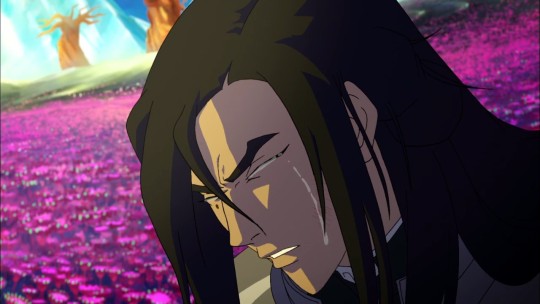
I liked seeing her cry like a little bitch tho that was cathartic and also sexy.
But you know who actually deserved the sympathy and empathy we were encouraged to give Kuvira? The Beifong family, especially the Zaofu crew! And if you follow me you've probably heard me ramble about this already but they really were the only real ones that season.
They were the literal only ones actively warning everyone about Kuvira and seeing through her bullshit. And it's no surprise, since they know Kuvira. Sure, their grudge against her probably influenced their opinions, but the comics show that there were symptoms of the person Kuvira would eventually become even as a child, like in her anger issues and her destroying Opal's dollhouse as punishment for Opal setting a very rational boundary.
I truly think the Beifong family deserved more screentime and we desrved to hear more out of all of them. As for example, Huan could easily illustrate the irl censorship and control totalitarian governments. Like, there's a reason Polish writer and painter Stanisław Witkiewicz overdosed and slit his wrists after hearing about the Soviets. One of his books also practically predicted the totalitarian control of Nazis and Soviets on Polish art and self expression. But the talk of Huan's wasted potential can wait for another time.
I also liked Wei calling Kuvira out after she was describing herself as a peaceful negotiator by going: You call bringing an army to threaten our city peaceful? After which the conversation was immediately redirected because really Kuvira couldn't maintain her flimsy moral ambiguity if the was answered.

This was his only line in the season and he ATE.
I frankly didn't care much for Toph's inclusion in the season? It felt rather contrived and existing purely for the viewers to get excited and recreate the Leonardo DiCaprio pointing at screen meme. This is the same feeling I had about Zuko in B3. Katara is the only cool Gaang octogenarian to me.
I didn't really have an opinion on Lin thsi season. She's.... there? I thought it was sweet that she went to rescue Suyin and that she seemed to have fixed her relationship with her to some extent. But honestly after 4 books her combative nature was overstaying its welcome. Being mean to traumatised teenagers as a middle aged cop is only funny the first few times.
I guess I enjoyed the relationship drama between Toph and Lin and it was nice to see them begin to reconcile. Though, once again it feels repetitive, like a mommy issues reskin of Lin and Suyin's conflict in B3.
Speaking of estranged Beifongs, I particularly liked Baatar Jr's storyline and think he would've made for a much better antag to sympathise with than Kuvira. I like the implications of his inferiority complex and his redeeming moments of trying to stop the spirit canon when Opal was in range of getting hit and the implication that he loved Kuvira much more than he did for the Earth Empire. It's not much, and he's certainly not a good person, but he had more grounds for a redemption than Kuvira.
And I loved Opal's storyline of opposing Kuvira so staunchly and being positioned as Kuvira's primary detractor. I love seeing how Opal had evolved between B3 and B4. How she's visibly more confident and sure in herself and willing to stand up for not only herself but those in need. Her hair growing messy after B3 is also so important to me and wonderful visual storytelling.
I do, however, have a few gripes with the treatment of her character, particularly the minimisation of her concern around Kuvira. Like the rest of the Beifongs, Opal is presented as irrational in her hostility towards Kuvira, which isn't the case at all. She is berated by established characters like Jinora and Korra for her stance, especially after the attempt on Kuvira's life. Actually, I think that: well Su and the twins were the aggressors in this situation, after Kuvira actively threatened military action on your peaceful city could constitute for gaslighting.
Even after Kuvira is proven multiple times to be dangerous and a threat, Opal's despaur over having her family captured and home conquered is treated as inconsequential grumpiness and is pushed aside in order to make room for the plot. Hell, Opal even tags along with Korra and Jinora to help investigate the Spirit Wilds.
(Opal is a better woman than me if someone pulled that shit on me I'd like. Not talk to them for at least a month.)
...And the second half of the season where she gets booted back into the love interest zone is fucking painful. The moment Bolin arrives in Republic City, Opal's very valid frustration and anger is reduced to a lovers' spat and focus is redirected to Bolin "winning her back". And after all is well in obligatory comphet world, I don't think Opal even speaks. It's like after she forgave Bolin and their relationship returned to status quo, she immediately just became an NPC.

Despite my hatred for how Bolin impacts Opal's storyline, I actually adored Bolin's being part of Kuvira's army, and how that was handled.
I liked seeing the continuation of Bolin being easily manipulated by those he looks up to due to his childhood. I liked the portrayal of Bolin's good intentions being used by Kuvira, since it once again parallels the irl inspirations behind Earth Empire .A huge chunk of the Soviets' detractors were actually disillusioned communists, who had joined and given their support, only to be betrayed by the system that they hoped would bring about a positive change.
Sadly, after Bolin deserted from Kuvira, this excellent set up isn't followed up on properly. Instead of any teaching moment or character development, we get Bolin moping for an episode, a few apologies and essentially a fetch quest. And after that, Bolin's honour is restored and he essentially goes back to how he was before B4. Which is dissapointing as hell.
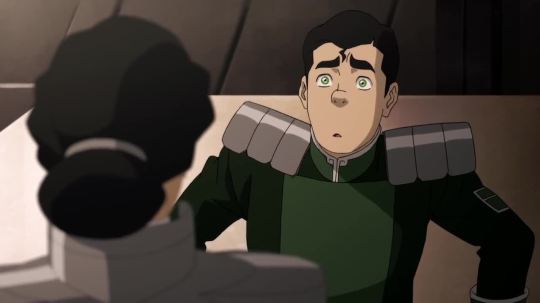
I really enjoyed Korra's recovery arc, it wa svery moving but not to the point of making me too uncomfortable. However, I don't like the notion that she had to suffer to learn compassion and 'become a better person', which is the implication. Because that's an extremely harmful idea and just false. Seeing Korra be constantly beaten down and hurt in the name of "learning compassion" or some bullshit is honestly unsettling.
I also think that Korra's personal arc was ill placed and messed with the main storyline. I think that showcasing Korra's new "compassionate" worldview on Kuvira is the main reason behind the downfall of Kuvira as a character for me. Trying to justify Kuvira's abhorrent actions in service of Korra's personal development is... a bit problematic to say the least

I actually despised Republic City being in the focus of this season. Like, so much is probably going on in the Earth Kingdom but we have to be stuck outside of the Iron Curtain. And meanwhile we have to sit through contrived plots in New York City but make it Oriental. It kinda reeks of USA self-centeredness. And it makes our main characters seem kinda like assholes because they're people with infuence and yet they're just chilling while people die in Concentration Camps so um.

I think the reason I hate B4 is because it's I also love it so much. I love it for the groundwork it set and for what it could've been. It could've been brilliant, but it ended up convoluting its messages and playing into harmful tropes, probably unintentionally.
The worst part of B4 is how good it started off. The begining was excellent and the second half drove it into the ground for me.
....and of course the best thing to come out of B4 was ✨️the weilin face pat✨️. Absolutely iconic scene, best ship in the show, hands down. Though I love that every single Krew Member was given a queer love interest.
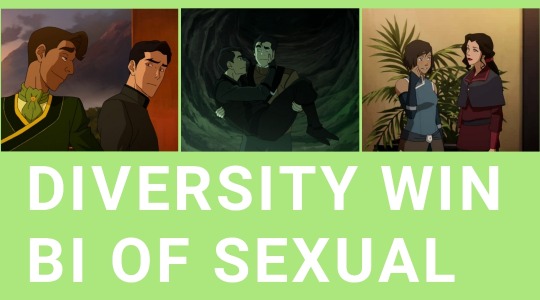
Slay. A gaggle of wild bisexuals.
#b4 my beloved amAND beloathed#avatar#legend of korra#tlok#the legend of korra#avatar the legend of korra#atlok#lok#kuvira#suyin beifong#huan beifong#wei beifong#baatar#baatar nr#lin beifong#toph#toph beifong#jinora#korra#opal beifong#weilin#korrasami#wuko
53 notes
·
View notes
Text
ultimately, yes, in any violent conflict, excesses will be carried out. the degree to which these excesses are carried out depends on both the general level of political development of the masses acting spontaneously, as well as the political character of the organised vanguard of the conflict. as communists, we can recognise that while decolonisation is good in any case, a national liberation movement lead, principally, by the workers movement will be both more effective and carry out fewer excesses than one led by simple bourgeois nationalists. we should, in the process of our own national struggles, recognise every excess carried out as our own failure, as a failure of our own communist organisations to properly develop and lead.
all this being said, the fact that colonial and imperialist forces purposefully suppress communist organisations, and preferentially give non-secular, bourgois nationalist groups a leading position in the movements against them (because they recognise the greater efficacy and danger of the workers movement) has a certain amount of irony to it. they self-select those fighters for national liberation most likely to carry out all its excesses against them, then cry at the atrocity.
362 notes
·
View notes
Text
"Before we can talk about the 7th octoer, we need to talk about the 6th October, in which a charity called Defense of Children International Palestine announced that it had been the deadliest year so far for children in the West Bank, over 42 I believe at that point had been killed.
That same day, settlers rioted in the town of Huwara, shooting a 19 year old, killing him, in the chest. While his funeral was going on, an Israeli minister went to Huwara , and said we needed to close down the Palestinian shops in the town, and build a highway arolund it for settlers.
That same day, the Washington post reported that Israel was cutting off the supply of donkeys, to Gaza, and donkeys were important because fuel was in insufficient supply and donkeys had become one of the main methods of moving supplies around.
So, October 6th was an atrocity too. "
Josh Paul, former US Official
Israel is not and has never been a peaceful immigrant population. They have been a merciless, brutalist occupying force who invaded someone else's home , stole it and violently occupy it to this day. ...and tried to gaslight them and the world into believing that they were there first. They weren't.
The jewish population originally in Palestine that lived peacefully alongside muslim Palestinians and christian Palestinians historically decended into the modern Palestinians, who over generations may have changed their religion, but share their genetic and historic identity. Many jewish Palestinians stayed in Palestine, they didn't all leave. Those that call themselves israeli Zionists and claim that that land was theirs originally are literally from every other place in the world, mostly germanic europe, and have no historic, genetic connection to the land or its originary population. Judaism is a religion, not an ethnicity
#Decolonise Palestine
youtube
#Palestine#Free Palestine#Decolonise Palestine#October 6th#Josh Paul#October 6th 2023#israel is a terrorist state#israel#human rights#truth#PSA#Important#Gaza#West Bank#The West Bank#Free The West bank#Occupation#Illegal Occupation#international Law#Free Gaza#invasion#Illegal israeli Invasion#Illegal israeli occupation#human rights violation#children#Defense Of Children International Palestine#Youtube
23 notes
·
View notes
Text
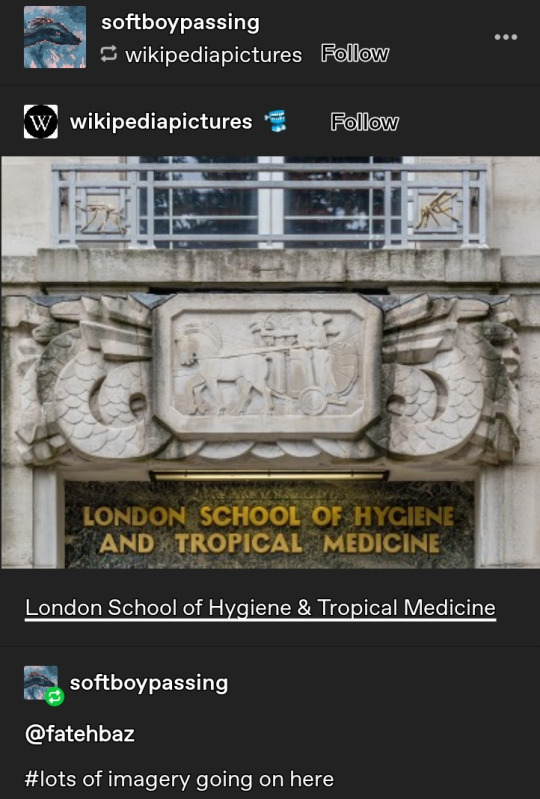
"defending civilization against bugs"
lol the mosquito sculpture

see Pratik Chakrabarti's Medicine and Empire: 1600-1960 (2013) and Bacteriology in British India: Laboratory Medicine and the Tropics (2012)
---
Sir Ronald Ross had just returned from an expedition to Sierra Leone. The British doctor had been leading efforts to tackle the malaria that so often killed English colonists in the country, and in December 1899 he gave a lecture to the Liverpool Chamber of Commerce [...]. [H]e argued that "in the coming century, the success of imperialism will depend largely upon success with the microscope."
Text by: Rohan Deb Roy. "Decolonise science - time to end another imperial era." The Conversation. 5 April 2018.
---
---
---
[A]s [...] Diane Nelson explains: The creation of transportation infrastructure such as canals and railroads, the deployment of armies, and the clearing of ground to plant tropical products all had to confront [...] microbial resistance. The French, British, and US raced to find a cure for malaria [...]. One French colonial official complained in 1908: “fever and dysentery are the ‘generals’ that defend hot countries against our incursions and prevent us from replacing the aborigines that we have to make use of.” [...] [T]ropical medicine was assigned the role of a “counterinsurgent field.” [...] [T]he discovery of mosquitoes as malaria and yellow fever carriers reawakened long-cherished plans such as the construction of the Panama Canal (1904-1914) [...]. In 1916, the director of the US Bureau of Entomology and longtime general secretary of the American Association for the Advancement of Science rejoiced at this success as “an object lesson for the sanitarians of the world” - it demonstrated “that it is possible for the white race to live healthfully in the tropics.” [...] The [...] measures to combat dangerous diseases always had the collateral benefit of social pacification. In 1918, [G.V.], president of the Rockefeller Foundation, candidly declared: “For purposes of placating primitive and suspicious peoples, medicine has some decided advantages over machine guns." The construction of the Panama Canal [...] advanced the military expansion of the United States in the Caribbean. The US occupation of the Canal Zone had already brought racist Jim Crow laws [to Panama] [...]. Besides the [...] expansion of vice squads and prophylaxis stations, during the night women were picked up all over the city [by US authorities] and forcibly tested for [...] diseases [...] [and] they were detained in something between a prison and hospital for up to six months [...] [as] women in Panama were becoming objects of surveillance [...].
Text by: Fahim Amir. "Cloudy Swords." e-flux Journal Issue #115. February 2021.
---
---
---
Richard P. Strong [had been] recently appointed director of Harvard’s new Department of Tropical Medicine [...]. In 1914 [the same year of the Panama Canal's completion], just one year after the creation of Harvard’s Department of Tropical Medicine, Strong took on an additional assignment that cemented the ties between his department and American business interests abroad. As newly appointed director of the Laboratories of the Hospitals and of Research Work of United Fruit Company, he set sail in July 1914 to United Fruit plantations in Cuba, Guatemala, Honduras, Costa Rica, and Panama. […] As a shareholder in two British rubber plantations, [...] Strong approached Harvey Firestone, chief executive of the tire and rubber-processing conglomerate that bore his name, in December 1925 with a proposal [...]. Firestone had negotiated tentative agreements in 1925 with the Liberian government for [...] a 99-year concession to optionally lease up to a million acres of Liberian land for rubber plantations. [...]
[I]nfluenced by the recommendations and financial backing of Harvard alumni such as Philippine governor Gen. William Cameron Forbes [the Philippines were under US military occupation] and patrons such as Edward Atkins, who were making their wealth in the banana and sugarcane industries, Harvard hired Strong, then head of the Philippine Bureau of Science’s Biological Laboratory [where he fatally infected unknowing test subject prisoners with bubonic plague], and personal physician to Forbes, to establish the second Department of Tropical Medicine in the United States [...]. Strong and Forbes both left Manila [Philippines] for Boston in 1913. [...] Forbes [US military governor of occupied Philippines] became an overseer to Harvard University and a director of United Fruit Company, the agricultural products marketing conglomerate best known for its extensive holdings of banana plantations throughout Central America. […] In 1912 United Fruit controlled over 300,000 acres of land in the tropics [...] and a ready supply of [...] samples taken from the company’s hospitals and surrounding plantations, Strong boasted that no “tropical school of medicine in the world … had such an asset. [...] It is something of a victory [...]. We could not for a million dollars procure such advantages.” Over the next two decades, he established a research funding model reliant on the medical and biological services the Harvard department could provide US-based multinational firms in enhancing their overseas production and trade in coffee, bananas, rubber, oil, and other tropical commodities [...] as they transformed landscapes across the globe.
Text by: Gregg Mitman. "Forgotten Paths of Empire: Ecology, Disease, and Commerce in the Making of Liberia's Plantation Economy." Environmental History, Volume 22, Number 1. January 2017. [Text within brackets added by me for clarity and context.]
---
---
---
[On] February 20, 1915, [...] [t]o signal the opening of the Panama-Pacific International Exposition (PPIE), [...] [t]he fair did not officially commence [...] until President Wilson [...] pressed a golden key linked to an aerial tower [...] whose radio waves sparked the top of the Tower of Jewels, tripped a galvanometer, [...] swinging open the doors of the Palace of Machinery, where a massive diesel engine started to rotate. [...] [W]ith lavish festivities [...] nineteen million people has passed through the PPIE's turnstiles. [...] As one of the many promotional pamphlets declared, "California marks the limit of the geographical progress of civilization. For unnumbered centuries the course of empire has been steadily to the west." [...] One subject that received an enormous amount of time and space was [...] the areas of race betterment and tropical medicine. Indeed, the fair's official poster, the "Thirteenth Labor of Hercules," [the construction of the Panama Canal] symbolized the intertwined significance of these two concerns [...]. [I]n the 1910s public health and eugenics crusaders alike moved with little or no friction between [...] [calls] for classification of human intelligence, for immigration restriction, for the promotion of the sterilization and segregation of the "unfit," [...]. It was during this [...] moment, [...] that California's burgeoning eugenicist movement coalesced [...]. At meetings convened during the PPIE, a heterogenous group of sanitary experts, [...] medical superintendents, psychologists, [...] and anthropologists established a social network that would influence eugenics on the national level in the years to come. [...]
In his address titled "The Physician as Pioneer," the president-elect of the American Academy of Medicine, Dr. Woods Hutchinson, credited the colonization of the Mississippi Valley to the discovery of quinine [...] and then told his audience that for progress to proceed apace in the current "age of the insect," the stringent sanitary regime imposed and perfected by Gorgas in the Canal Zone was the sine qua non. [...]
Blue also took part in the conference of the American Society for Tropical Medicine, which Gorgas had cofounded five years after the annexation of Cuba, Puerto Rico, and the Philippines. Invoking the narrative of medico-military conquest [...], [t]he scientific skill of the United States was also touted at the Pan-American Medical Congress, where its president, Dr. Charles L. Reed, delivered a lengthy address praising the hemispheric security ensured by the 1823 Monroe Doctrine and "the combined genius of American medical scientists [...]" in quelling tropical diseases, above all yellow fever, in the Canal Zone. [...] [A]s Reed's lecture ultimately disclosed, his understanding of Pan-American medical progress was based [...] on the enlightened effects of "Aryan blood" in American lands. [...] [T]he week after the PPIE ended, Pierce was ordered to Laredo, Texas, to investigate several incidents of typhus fever on the border [...]. Pierce was instrumental in fusing tropical medicine and race betterment [...] guided by more than a decade of experience in [...] sanitation in Panama [...]. [I]n August 1915, Stanford's chancellor, David Starr Jordan [...] and Pierce were the guests of honor at a luncheon hosted by the Race Betterment Foundation. [...] [At the PPIE] [t]he Race Betterment booth [...] exhibit [...] won a bronze medal for "illustrating evidences and causes of race degeneration and methods and agencies of race betterment," [and] made eugenics a daily feature of the PPIE. [...] [T]he American Genetics Association's Eugenics Section convened [...] [and] talks were delivered on the intersection of eugenics and sociology, [...] the need for broadened sterilization laws, and the medical inspection of immigrants [...]. Moreover, the PPIE fostered the cross-fertilization of tropical medicine and race betterment at a critical moment of transition in modern medicine in American society.
Text by: Alexandra Minna Stern. Eugenic Nation: Faults and Frontiers of Better Breeding in Modern America. Second Edition. 2016.
#literally that post i made earlier today about frustration of seeing the same colonial institutions and leaders showing up in every story#about plantations and forced labor my first draft i explicitly mentioned the harvard school tropical medicine and kew royal botanic garden#abolition#ecology#imperial#colonial#bugs#indigenous#multispecies#civilization vs bugs#tidalectics#archiepalgos#my writing i guess
265 notes
·
View notes
Text
Decolonisation is beautiful.
Here’s just one example from one small corner of one small Estonian town, Viljandi.
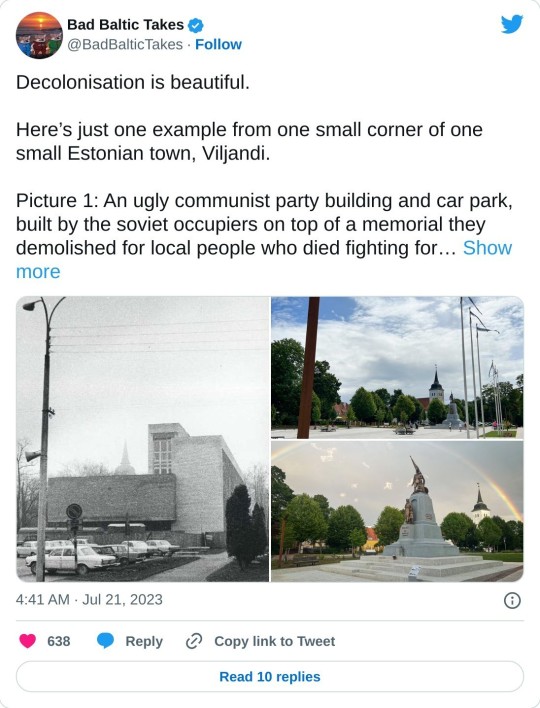
Picture 1: An ugly communist party building and car park, built by the soviet occupiers on top of a memorial they demolished for local people who died fighting for independence.

Pictures 2 & 3: The memorial, lovingly recreated down to every last detail, is back at the heart of a public square.
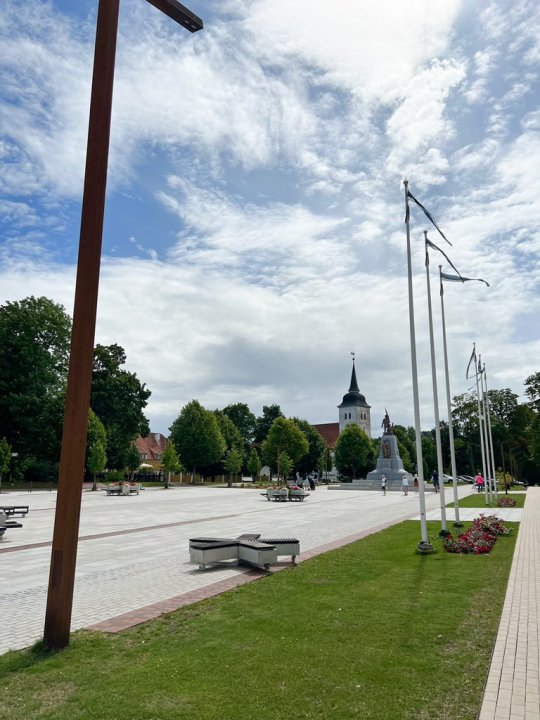
There are some commentators abroad who like to lecture russia’s neighbours not to “erase history” by removing the scars of occupation.
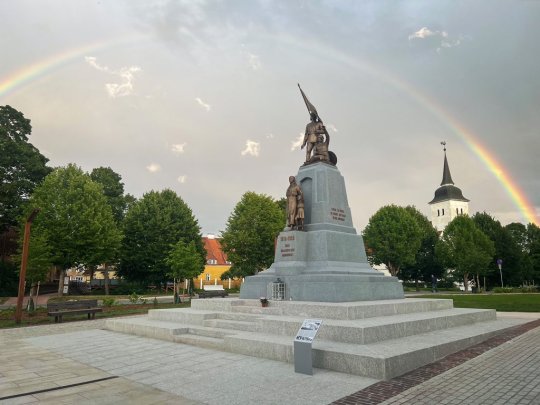
It’s weird because this kind of thing is normal everywhere else in the world. In fact, the very same people who get particularly upset about occupation monuments being removed here also tend to be very articulate about the importance of removing statues to ousted oppressors elsewhere. They just think russian imperialism gets a free pass.
Newsflash: It doesn’t.
Rather than erase history, plenty of occupation junk across the Baltic countries has been transferred to museums so that future generations can learn about it in its proper context. But it doesn’t belong in our public spaces. Local people here hated that brutal communist party building, which desecrated the memorial in a way so symbolic of the wider ugliness of russian imperialism.
Public spaces belong to the people who actually live here and should reflect the kind of free, modern, open, independent countries that we are - and which remember those who made it possible.
The other bad take on this issue is to constantly frame this kind of thing as a ‘reaction/response/message to russia’. That, again, is imperialist thinking. We make decisions for our countries based on what we want our countries to be. We’d want to remove this kind of junk even if russia had ceased to exist in 1991 or if it had flourished into a friendly democracy.
In fact, here in Viljandi, it took three decades of planning and sculpting to recreate the monument based off grainy photos of the original. The building was finally knocked down a couple of years ago and the memorial unveiled this midsummer.
In the interim, the building was expanded after the occupation to serve as Tourist Information, which was pretty ironic considering the communist aim was to keep us closed to the world. But that has a new home and the time has come to return the space.
There was quite a debate locally about whether to recreate it exactly or update it with some kind of modern reinterpretation. Both are legitimate, interesting ideas.
In the end, the only difference is that the materials are now of a much higher quality. I think they made the right decision.
And the fact that it was recreated in perfect detail by people who never saw the original but emerged from occupation with the same determination to live free does send its own new message from our time too. We will continue to exist.
Decolonisation can suffer setbacks, horrendously painful as we see in Ukraine, but the long term trend is unstoppable. The special protection that russian imperialism still enjoys in the minds of many around the world is starting to shatter.

I stopped by to take a photo of it for you all and a rainbow appeared. 🙂
#decolonisation#viljandi#estonia#soviet times#russian imperialism#ukraine resistance#stop russian invasion#putin war criminal#ukraine war#help ukraine#i stand with ukraine#slava ukraini#give weapons to ukraine
291 notes
·
View notes
Text
Fire Nation Royal Family Analysis: The Archetypes. (Part 1)
Delving into how Sozin and Zeisan are like Azula and Zuko.
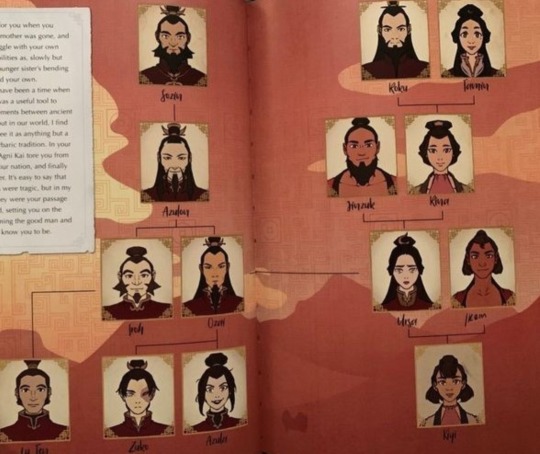
Within the Fire Nation Royal Family, two main archetypes can be noticed. The Golden Child and the Hated Child, both of which are victims in the cycle of abuse. Who fits where, and how can we recognise these archetypes?
Azula and Sozin obviously belong in the same archetype—that of the golden child. Meanwhile, Zuko shares many parallels with Zeisan. But in Iroh's and Ozai's generation, things *really* switch up.
To better understand the royal family, let's examine them all from the beginning.
[GEN. 1] SOZIN/ZEISAN
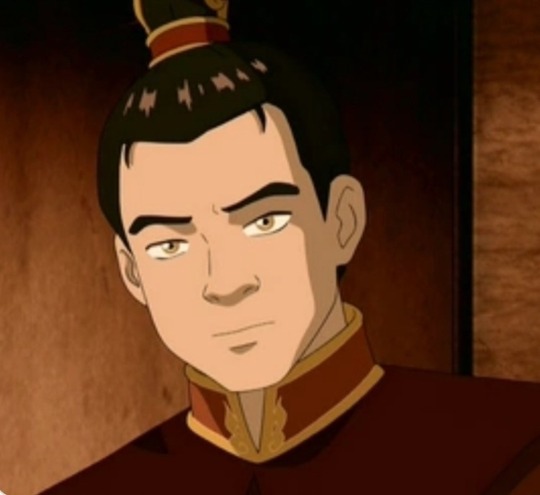
Sozin was the:
-powerful firebending sibling
-had prestige due to his position
-golden child
-not a Very Good Best Friend
-obsessed with said best friend (Roku) due to deeming he was betrayed by him, spent all of his elderly years searching for Roku's reincarnation
-influenced by his father's nationalistic beliefs, yet wanted to outdo him and appear more fearsome than him
-“his relationship with Zeisan was always poor, although this was the result of their parents' influence”
-perfectionist that becomes "sloppy when angry"
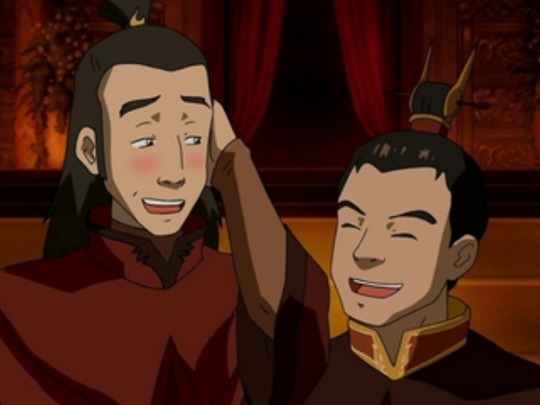
“Sozin and Zeisan's teachers and family always pitted them against each other, with the two siblings fighting for as long as they could remember. The competitions were meant to drive Sozin to greater heights and to draw firebending abilities out of Zeisan, though his sister never proved to be a firebender, with their teachers thus focusing their attention entirely upon Sozin.”
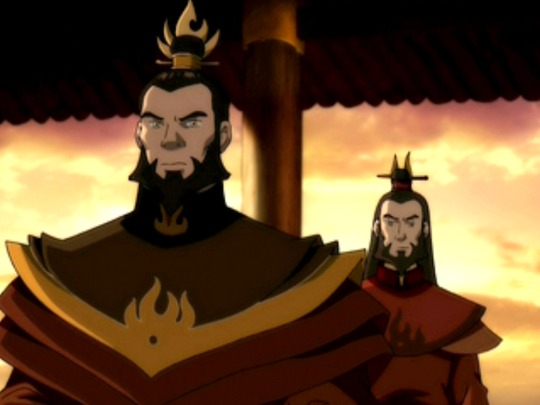
“During Sozin's early life, the Fire Nation experienced an era of industrialization and great prosperity, and trade flourished. While Zeisan sensed the corruption growing within their family, Sozin was influenced by his father's beliefs, according to which a nation's worldly power and landmass corresponded to greatness”
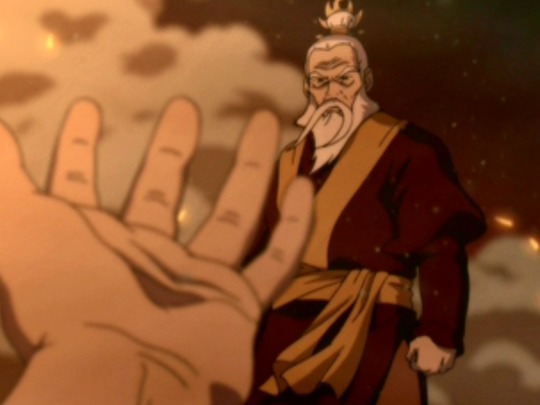
At the end of his life, Sozin expressed regret for his actions. That, believe it or not, did not bring back the airbender, or the dragons, and certainly didn't decolonise the earth kingdom.
_____________________________________________
ON THE OTHER HAND, ZEISAN:
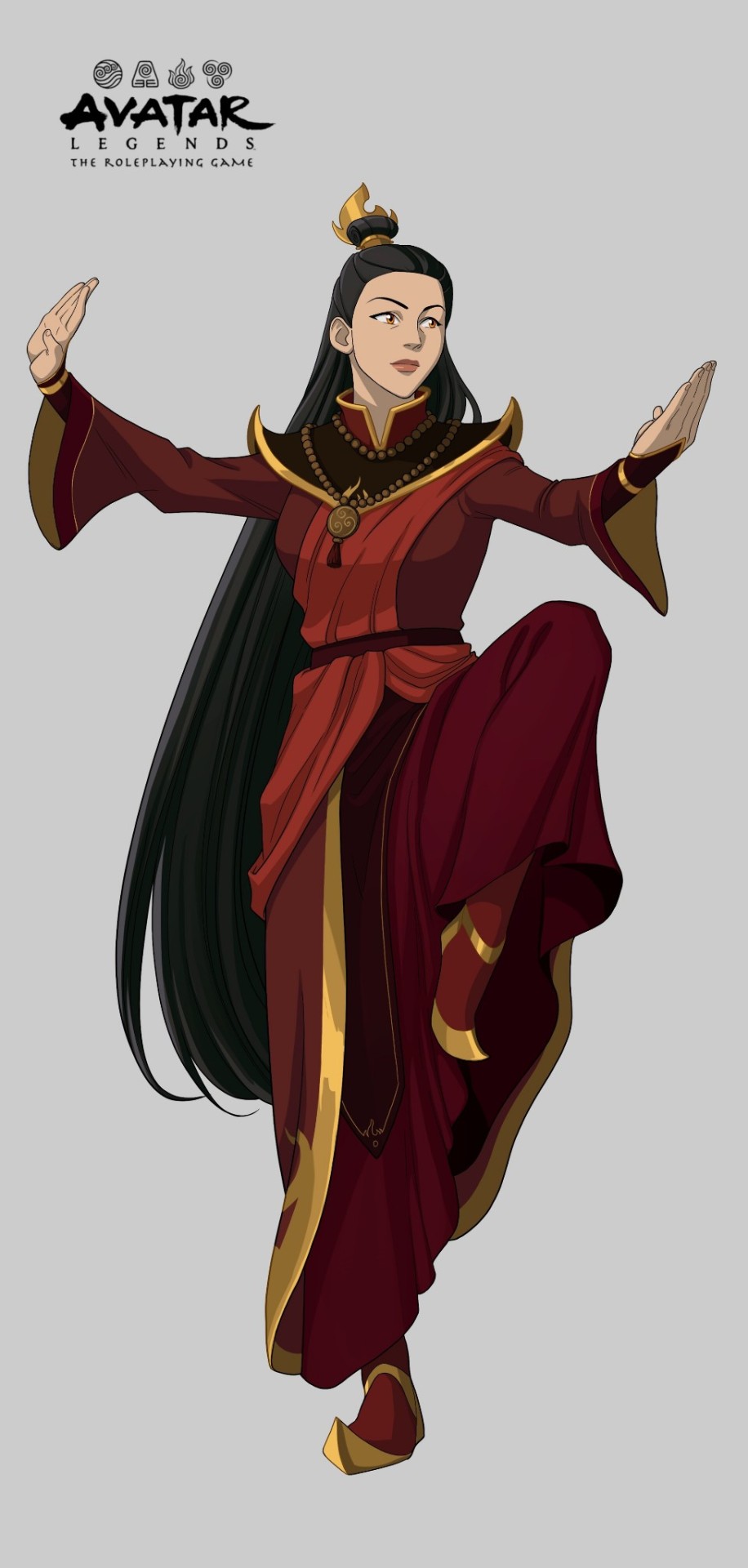
-struggled to keep up, not gifted, NOT a firebender or prodigy like her brother
-despite the increased focus on Sozin, Zeisan refused to stop competing, studying, and growing, striving to prove herself worthy of her family legacy. honor!
-she studied and embraced air nomad philosophy and redeemed herself, realising the legacy of the fire nation wasn't one she wanted to take part in
-Instead of running away from her responsibilities, Zeisan wished to dismantle her family's legacy of corruption, eventually joining the air nomads, becoming allies to stop the fire nation nobility.
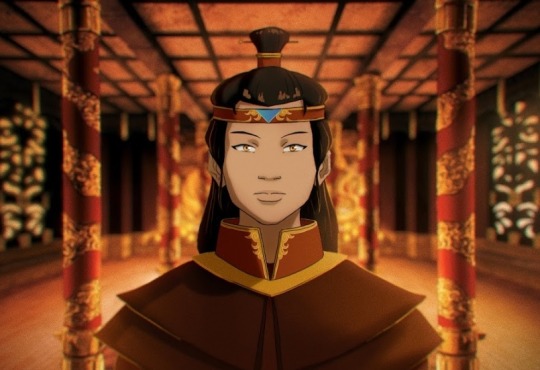
“Zeisan shared the intensity of her brother Sozin and doubted her own ability to be good, but she was focused on dismantling her family's corruption, demonstrating an indomitable will and desire to better the world. Zeisan was active and driven, constantly pursuing her own goals. She was very ambitious and sought to undermine her brother's rule.”
_____________________________________________
Now, this dynamic, to me, SCREAMS Azula and Zuko. Azula quite obviously being Sozin and Zuko quite obviously being Zeisan.

More specifically, Azula being the prodigy, the holden child, who grows obsessive, eith visions of her mother—(reminiscent of Sozin's own paranoia regarding Roku) While also feeling like she was betrayed by Mai and Ty Lee, her best friends, her “Roku” figures—a betrayal which was absolutely caused by her own behaviour, but caused her to spiral into the worst version of herself. Paranoid and destructive, much like what became of Sozin. She was also a perfectionist who, upon losing her mind, obviously lacked focus—and her relationship with Zuko was strained because they were always pinned against each other.
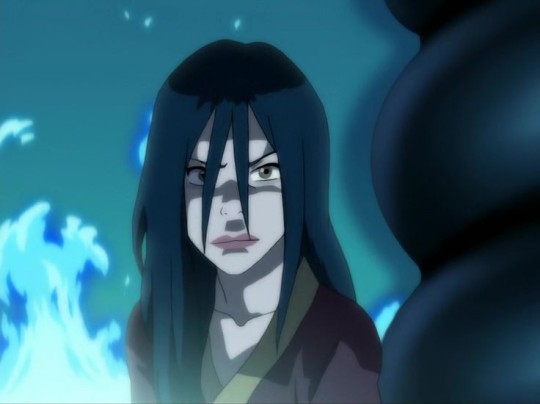
Zuko, on the other hand, is the disliked—abandoned child. Much like Zeisan, he seeked honor and appreciation within the royal family. He was no natural talent, but he had drive and ambition and he never gave up. Upon realising his family's corruption, he wanted to take no part in it. So he redeemed himself in joining the Avatar. The last of the air nomads. Just like Zeisan joined them, back then. So, parallels.
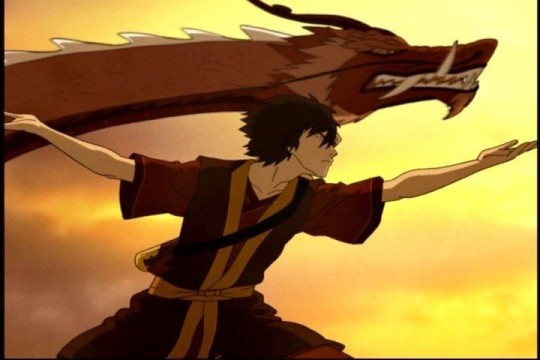
_____________________________________________
Something to notice is that, out of the two siblings, the one who takes (or is meant to take the throne) always has just ONE child. Sozin only had Azulon. Iroh only had Lu Ten. Zuko only had Izumi.
Each of them probably wanted to avoid the repetition of the cycle. They wanted to avoid their children having a relationship so strained like the one they had with their siblings. With that being said—let's examine Azulon.
_____________________________________________
73 notes
·
View notes
Note
Books you would recommend on this topic? Colonial, post colonial, and Cold War Asia are topics that really interest me. (Essentially all of the 1900s)
Hello! An entire century is huge and I don't quite know what exactly you're looking for, but here we are, with a few books I like. I've tried organising them, but so many of these things bleed into each other so it's a bit of a jumble
Cold War
1971 by Srinath Raghavan: about the Bangladesh Liberation War within the context of the Cold War, US-Soviet rivalry, and the US-China axis in South Asia
Cold War in South Asia by Paul McGarr: largely focuses on India and Pakistan, and how the Cold War aggravated this rivalry; also how the existing tension added to the Cold War; also the transition from British dominance to US-Soviet contest
Kennedy, Johnson, and the Nonaligned World by Robert B. Rakove: on the US' ties with the Nonaligned countries during decolonisation and in the early years of the Cold War; how US policy dealt with containment, other strategic choices etc
South Asia's Cold War by Rajesh Basrur: specifically about nuclear buildup, armament and the Indo-Pak rivalry within the larger context of the Cold War, arms race, and disarmament movements
Colonialism
India's War by Srinath Raghavan: about India's involvement in World War II and generally what the war meant for South Asia politically, economically and in terms of defense strategies
The Coolie's Great War by Radhika Singha: about coolie labour (non-combatant forces) in the first World War that was transported from India to battlefronts in Europe, Asia and Africa
Unruly Waters by Sunil Amrith: an environmental history of South Asia through British colonial attempts of organising the flow of rivers and the region's coastlines
Underground Revolutionaries by Tim Harper: about revolutionary freedom fighters in Asia and how they met, encountered and borrowed from each other
Imperial Connections by Thomas R. Metcalf: about how the British Empire in the Indian Ocean was mapped out and governed from the Indian peninsula
Decolonisation/Postcolonial Asia
Army and Nation by Steven Wilkinson: a comparative look at civilian-army relations in post-Independence India and Pakistan; it tries to excavate why Pakistan went the way it did with an overwhelmingly powerful Army and a coup-prone democracy while India didn't, even though they inherited basically the same military structure
Muslim Zion by Faisal Devji: a history of the idea of Pakistan and its bearing on the nation-building project in the country
The South Asian Century by Joya Chatterji: it's a huge book on 20th century South Asia; looks at how the subcontinental landmass became three/four separate countries, and what means for history and culture and the people on the landmass
India Against Itself by Sanjib Baruah: about insurgency and statebuilding in Assam and the erstwhile NEFA in India's Northeast. Also see his In the Name of the Nation.
I hope this helps!
54 notes
·
View notes
Text
re: the post below. fantasy vs reality
a discussion in the notes got me thinking about the recent trend (perhaps not the right word, maybe “tendency”) of communist/marxist bloggers on here, especially those concerned with decolonisation (as we all should be), to blanket-condemn all media which “romanticises” pirates, cowboys, knights, outlaws, and other “historical” (in quotes because, let’s be real, it’s more legend than history when we talk about the modern portrayal of these lifestyles) morally dubious yet immensely alluring occupations. there’s been this discourse spreading: the idea that somehow indulging in art which presents these figures in a generally positive or fun light is the same as being uncritical of manifest-destiny expansionism (i.e. the notion of the ‘wild west’ and an ‘untamed frontier’ is colonial), christian imperialism (since knights participated in the crusades) or even an apologist of the slave trade (because some pirates engaged in it).
to which i say, plainly, bollocks. if you’re 16 or younger, your critical thinking faculties are an untrained muscle, your media analysis capacity not yet switched-on, then yeah, you’re allowed to be susceptible to the inability to distinguish between what’s cool in fiction and what’s permissible in reality. any older than that, i start getting doubts. i question the frankly patronising notion that an adult with a basic understanding of history and politics is incapable of recognising when something fictional doesn’t map one-on-one onto the modern world, whether that be the mechanics of a story, the interactions between characters, the beliefs and goals which drive them, or the social mores and cultural norms (hierarchy of gender, race, nobility etc) which they accept as fact.
you should be able to hold (more than) two truths in your head simultaneously. you should be able to cheer when the knight pulls the sword from the stone and reclaims his long-denied royal heritage to become a well earned leader, and, at the same time, recognise that we live in the 21st century where monarchy is a long-obsolete, unjust and inhumane system of government. same as you’d readily accept that somebody in a novel can cast a spell, but you wouldn’t believe that a real guy could set a tree alight with his mind.
all fiction is fantasy because we don’t live in history. yeah, we have sources, but they’re not perfect. even the author attempting to be as accurate as possible will inevitably sneak in some tiny anachronisms, even if in language alone. medieval europe didn’t have potatoes. you will find potato stew boiling in every tavern in the fantasy pseudo-german towns your protagonists take a rest stop in. that’s fine. that’s normal. pirates in reality were mostly cruel hardened criminals with no respect for human life, which is why they gladly partook in slavery as well as pillaging and looting, anything for profit. pirates in a show can be kind, considerate, a rag-tag team of outcasts and freedom fighters with views that most correspond with modern anarchism. as long as you know the difference, as long as you’re not pretending that this fantasy is how historical events actually happened, it’s fine. you’re good. go watch your bridgertons.
make sure to stay prudent and always tell the difference, though. never ever fall into the trap of wanting to ‘retvrn’, and that goes towards ever cottagecore homesteader. let fiction remain fiction, and work to better the world.
21 notes
·
View notes
Note
History denial (yes we were definitely colonized by the Muslim invaders who broke and looted our temples and forcefully converted and massacred many of our people, taking our temples back is a decolonization movement as pointed out by that other anon). Then Kashmir is an integral part of India denial... how can you even say that.
I'm myself a Hindu and a queer, and reading your views came as an unpleasant surprise. Please go do some reading, and educate yourself about how reclaiming temples isn't about hating other communities. Muslims and other minorities can and have been living in peace with Hindus for centuries. What the invaders did was wrong, and acknowledging that doesn't make Hindus Muslim haters.
You answered that other anon with no reasoning, just that whatever happened, happened before your time. All vibes no research or learning.
Unfollowing. I can make Mahabharat quotes myself.
Tipu Sultan famously destroyed temples as well as donated heavily to temples.
You tell me what to think of that.
Temples have been the site of politics since time immemorial. They were the storehouses of public engagement. And that's why they were attacked. And if we draw this logic to today: Religion is in itself politics. You cannot seperate your celebration of the Ram temple from what it really signifies: The destruction of what is presumed to be a mark of colonization.
Agreed, Muslim rulers did demolish temples. But you take one look at the bulldozer politics of today and tell me: Who is being held accountable here? Are the poor Pasmanda and lower caste muslims, who barely have enough space for themselves to live the descendants of Mahmud of Ghazni? Did they inherit the wealth of whatever was looted from the Somnath temple?
Also tell me one thing: why did the Supreme court not conclude on whether there was a temple structure under the mosque, and still give the go signal? Why was the government assigned priest murdered for stating that the Ram Mandir was purely political? Why were there many 'Ram Janmabhoomi' sites before the Babri Masjid issue? And this is not ancient history, dear anon, this was hardly a generation back.
All I ask of you is to engage critically with the world around you. Yes, celebrate Ram within your house, Mod S and I will not break into your house and laugh at you. But take one look around you as to how your celebrations are actually built on others' misery.
Oh, and by the way: if we as a nation were really decolonising.......why are massive corporations kicking Adivasis of their lands in Aarey, Hasdeo (where our dear Adani is trying to 'develop' coal mines), Gadchiroli, and many many many many places where displacement happens through casteist Panchayat meetings which are held under the supervision of the State (which are not done in the presence of the people actually affected by such projects).
In my head it means one thing: The Ram Mandir is only a carrot waved in front of us to distract us from the real State Violence that goes on. And personally, I think that's a very disrespectful way of using a god. Its actually.....saddening.
Thank you for protecting your peace and unfollowing us, though! I wish you farewell on your internet journey
-Mod G
---------
Hello, Anon-Who-Is Unfollowing-And-Have-Decided-to-Announce-Your-Departure-Because-You-Wanted-Our-Attention,
Well, you have my attention. But it seems like I don't have yours because you have somehow managed to only read one paragraph selectively and completely gloss over everything else.
If you had read what I said clearly, you would have clearly seen the part where I said that the political majority CANNOT claim reclamation because YOU ARE NOT OPPRESSED. YOU HAVE ALL THE POWER. Do you understand this? Or has any hint of nuance completely managed to escape you? YOU, AS A SELF-PROFESSED HINDU, ARE NOT BEING OPPRESSED FOR YOUR HINDU IDENTITY IN THIS COUNTRY. YOU IN NO WAY ARE EVEN A LITTLE BIT HARMED BY A TEMPLE BEING DESTROYED CENTURIES AGO.
You want to talk about decolonisation? Let's talk about how the term "Hindu" that you're so proud of is actually a very recent term and is actually only a thing because the European colonisers just wanted an easy religious box to put us all in. If you're really so gung-ho about decolonisation, please decolonize yourself fully and throw away this term too. While we're at it, let's also examine why your decolonisation efforts are so selective?
"I'm myself a Hindu and a queer". I notice you conveniently skipped over the "dalit" part of my identity that actually might have led to a massive difference in lived experience in this country. I also talked about reparation to the "lower" castes. You skipped that too.
What the invaders did was wrong, and what you're doing is wrong too. Their wrongs don't mean that you are automatically right.
I gave you all my reasoning, told you everything. You skimmed through them and paid attention to the only part that you wanted to focus on.
Thank you for unfollowing, I hope you have a good day.
-Mod S
57 notes
·
View notes
Text
by Moshe Phillips
Dozens of Palestinian Authority diplomats around the world celebrated the Oct. 7 massacres, according to a new study. The revelations have important implications for anybody concerned about the prospects for Middle East peace.
The study was undertaken by GnasherJew, a group of British Jewish investigative journalists, and reported by The Jewish Chronicle based in London. GnasherJew is best known for exposing the antisemitic remarks made by Jeremy Corbyn, the former leader of Britain’s Labour Party.
Subscribe to The JNS Daily Syndicate by email and never miss our top storiesFree sign up
By signing up, you agree to receive emails from JNS and allied pro-Israel organizations.
While the U.S. State Department, The New York Times, and J Street keep telling us that the P.A. opposes terrorism and wants to live in peace next to Israel, the statements made by the P.A.’s own representatives around the world say otherwise.
The investigators reviewed hundreds of social-media posts by more than 30 senior P.A. diplomats in the days following Oct. 7. Here’s a sampling of what these P.A. officials wrote about the most horrific mass murder of Jews since the Holocaust:
• Great Britain: Rana Abuayyash, consul at the P.A.’s mission to London, posted an image of an Israeli flag morphing into Adolf Hitler.
• France: Hala Abou-Hassira, the P.A. ambassador to Paris posted: “Israel bears full responsibility.” His colleague Nadine Abualheija tweeted: “A colonial state is not an innocent victim when its victims resist genocide.” Another P.A. diplomat in Paris, Jamila Hassan Eragat, wrote: “Don’t judge a group of people for rising up against their oppressors … violence is necessary for decolonisation.”
• Spain: Khaldun Almassri of the P.A. mission in Spain shared a painting of people dancing with flags of the Palestinian Liberation Organization on Oct. 7.
• Cyprus: “Palestinians broke through with so much excitement,” the official Facebook account for the P.A. embassy in Cyprus announced.
• Mozambique: The P.A. ambassador in Mozambique, Fayez Abduljawad, posted a graphic that read: “If you are silent when Israel kills Palestinians, remain silent when Palestinians defend themselves.”
• Guinea: Thaer Abubaker, the P.A. ambassador to Guinea and Sierra Leone, wrote on X (Twitter) that the Oct. 7 slaughter was “heroic” and that “liberation is the goal of every fighter who risks their life for the sake of freedom and jihad for God’s path.” He also accused America’s secretary of state of being “a Khazar Jew” and charged Jewish immigrants to Israel with bringing “scabies and contagious diseases to Palestine.”
• Zimbabwe: Manar Alagha, a P.A. diplomat in Zimbabwe, posted a video on Facebook of Israelis fleeing the Nova music festival concert grounds, adding the slogan: “Here to victory!”
• Ivory Coast: An official at the P.A.’s embassy in the Ivory Coast, Khattab Bayyari, showed a graphic of a terrorist paraglider and added the caption: “You are the soldiers of Allah in the field.” He also posted a photo of a man with a sign displaying an anti-Israel vulgarity.
• Japan and South Korea: The P.A.’s ambassador to Japan and South Korea, Waleed Siam, wrote on X/Twitter: “Zionism is really curse on all humanity,” and added, for good measure, that Israelis “have yet to find proof of their imaginary temple.” (Asked by the Jewish Chronicle about those messages, Siam replied: “I have Semitic origins myself.”)
• Turkey: The P.A.’s consul general in Istanbul, Hana Abu Ramadan, circulated a hate cartoon depicting Israeli Prime Minister Benjamin Netanyahu as a devil with horns.
• United Nations: Khuloussi Bsaiso, a P.A. diplomat at the United Nations, distributed a Middle East map without Israel that had the slogan, “Palestine as it should be.”
• European Union: Hassan Albalawi, the deputy head of the P.A. mission to the European Union, called the Hamas massacres “heroic.” Adel Atieh, the P.A. ambassador to the European Union, hailed the terrorists as “the people of the mighty,” who are fighting for “freedom and breaking tyranny.” Another P.A. diplomat at the European Union, Lema Nazeeh, wrote on X that the Hamas invasion was “decolonisation in tangible terms,” a day of “dignity and triumph.”
And because no review of Palestinian Arab antisemitism is complete without a dose of old-fashioned religious bigotry, it’s worth noting that Salman El Herfi, the former P.A. ambassador to South Africa and France, who is now a top adviser to P.A. chief Mahmoud Abbas, posted a medieval Christian image next to a photo of a mother and child in Gaza with the caption: “The pain of the Mother is the same as it was 2,000 years ago. The same killer.”
The P.A.’s diplomats around the world are the “best face” of the Palestinian Arab cause. They are the P.A.’s most articulate and urbane spokespeople. They wear suits and ties; they speak the best English. One would imagine they would be the most concerned about appearing “moderate” in the eyes of the wider world.
Yet here they are—the P.A.’s most sophisticated officials—openly celebrating the mass murder, gang rapes and baby-burnings of Oct. 7. That tells you all you need to know about their alleged interest in peace with Israel.
14 notes
·
View notes